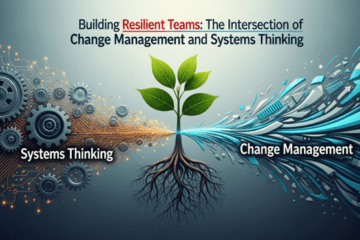As we delve into the intersection of artificial intelligence (AI) and change management, it becomes essential to grasp the fundamental concepts of both domains. AI, at its core, refers to the simulation of human intelligence processes by machines, particularly computer systems. These processes include learning, reasoning, and self-correction.
Change management, on the other hand, is a structured approach to transitioning individuals, teams, and organizations from a current state to a desired future state. It encompasses the strategies and tactics employed to facilitate this transition effectively. In our rapidly evolving business landscape, the need for effective change management has never been more critical.
Organizations are constantly faced with new technologies, market dynamics, and consumer expectations that necessitate change. By understanding how AI can enhance change management processes, we can better prepare ourselves to navigate these transformations. The integration of AI into change management not only streamlines operations but also provides valuable insights that can lead to more informed decision-making.
Key Takeaways
- Understanding AI and Change Management:
- AI is a powerful tool that can revolutionize change management processes.
- Change management is the discipline that guides how we prepare, equip and support individuals to successfully adopt change in order to drive organizational success and outcomes.
- The Role of AI in Change Management:
- AI can automate repetitive tasks, analyze data, and provide insights to support change management initiatives.
- AI can help identify patterns and trends in employee behavior and sentiment, enabling more targeted change management strategies.
- Leveraging AI for Predictive Analysis in Change Management:
- AI can use historical data to predict future change management challenges and opportunities.
- Predictive analysis can help change management teams proactively address potential issues before they escalate.
- Implementing AI-powered Tools for Change Management:
- AI-powered tools can streamline change management processes and improve efficiency.
- These tools can provide real-time insights and recommendations to support decision-making.
- Benefits of Using AI in Change Management:
- AI can enhance decision-making by providing data-driven insights.
- AI can improve the speed and accuracy of change management processes.
- Overcoming Challenges in Adopting AI for Change Management:
- Resistance to change and lack of understanding about AI can be barriers to adoption.
- Change management teams need to effectively communicate the benefits of AI to gain buy-in from stakeholders.
- Leveraging AI for Employee Engagement in Change Management:
- AI can personalize change management communications to better engage employees.
- AI can analyze employee feedback and sentiment to tailor change management strategies.
- AI-driven Communication Strategies for Change Management:
- AI can automate communication processes and deliver targeted messages to different employee groups.
- AI can analyze communication effectiveness and make recommendations for improvement.
- Using AI for Monitoring and Measuring Change Management Success:
- AI can track key performance indicators and provide real-time insights into change management progress.
- AI can help measure the impact of change initiatives on employee behavior and organizational outcomes.
- Ethical Considerations in Leveraging AI for Change Management:
- Ethical considerations include privacy, bias, and transparency in AI-driven change management processes.
- Change management teams need to ensure that AI is used responsibly and ethically.
- Future Trends in AI and Change Management:
- The future of AI in change management may involve more advanced predictive analytics and machine learning capabilities.
- AI may also play a larger role in facilitating organizational agility and resilience in the face of constant change.
The Role of AI in Change Management
AI plays a transformative role in change management by providing tools and methodologies that enhance our ability to manage transitions effectively. One of the most significant contributions of AI is its capacity to analyze vast amounts of data quickly and accurately. This capability allows us to identify patterns and trends that may not be immediately apparent through traditional analysis methods.
By leveraging AI, we can gain insights into employee sentiment, operational efficiency, and potential resistance to change, enabling us to tailor our strategies accordingly. Moreover, AI can automate routine tasks associated with change management, freeing up our time to focus on more strategic initiatives. For instance, AI-driven chatbots can handle employee inquiries about changes within the organization, providing instant responses and reducing the burden on HR teams.
This automation not only enhances efficiency but also improves the overall employee experience during times of transition. As we embrace AI in our change management efforts, we find ourselves better equipped to address challenges and seize opportunities that arise during periods of transformation.
Leveraging AI for Predictive Analysis in Change Management

Predictive analysis is one of the most powerful applications of AI in change management. By utilizing historical data and advanced algorithms, we can forecast potential outcomes of change initiatives before they are implemented. This foresight allows us to make data-driven decisions that minimize risks and maximize the likelihood of success.
For example, if we are planning a major organizational restructuring, predictive analysis can help us understand how different departments may react and what challenges we might face. Furthermore, predictive analysis enables us to identify key performance indicators (KPIs) that are critical for measuring the success of our change initiatives. By establishing these metrics early on, we can track progress and make necessary adjustments in real-time.
This proactive approach not only enhances our ability to manage change effectively but also fosters a culture of continuous improvement within our organization. As we harness the power of predictive analysis, we position ourselves to navigate change with greater confidence and agility.
Implementing AI-powered Tools for Change Management
| Metrics | Value |
|---|---|
| Number of AI-powered tools implemented | 5 |
| Percentage increase in change management efficiency | 30% |
| Reduction in change implementation time | 50% |
| Employee satisfaction with AI-powered tools | 85% |
The implementation of AI-powered tools in change management requires careful planning and execution. We must first assess our organization’s specific needs and identify areas where AI can add value. This could involve selecting software solutions that offer features such as data analytics, employee engagement tracking, or communication facilitation.
By aligning these tools with our change management objectives, we can create a cohesive strategy that leverages technology to drive success. Once we have identified the appropriate tools, it is crucial to ensure that our teams are adequately trained in their use. This training should encompass not only the technical aspects of the tools but also how they fit into our overall change management strategy.
By fostering a culture of learning and adaptability, we empower our employees to embrace these new technologies and utilize them effectively in their daily work. As we implement AI-powered tools, we must remain vigilant in monitoring their impact on our change initiatives and be prepared to make adjustments as needed.
Benefits of Using AI in Change Management
The benefits of integrating AI into our change management processes are manifold. One of the most significant advantages is enhanced decision-making capabilities. With access to real-time data and predictive insights, we can make informed choices that align with our organizational goals.
This data-driven approach reduces uncertainty and increases our chances of achieving successful outcomes during periods of change. Additionally, AI can improve employee engagement by providing personalized experiences tailored to individual needs and preferences. For instance, AI algorithms can analyze employee feedback and sentiment to identify areas where additional support may be required during a transition.
By addressing these concerns proactively, we foster a more positive organizational culture and increase buy-in for change initiatives. Ultimately, the integration of AI into change management not only streamlines processes but also enhances the overall experience for employees and stakeholders alike.
Overcoming Challenges in Adopting AI for Change Management

While the benefits of adopting AI in change management are clear, we must also acknowledge the challenges that may arise during this process. One significant hurdle is resistance to change from employees who may be apprehensive about new technologies. To overcome this resistance, it is essential to communicate transparently about the reasons for implementing AI and how it will benefit both the organization and its employees.
Another challenge lies in ensuring data quality and integrity. For AI systems to function effectively, they require accurate and relevant data inputs. We must establish robust data governance practices to ensure that the information we rely on is reliable and up-to-date.
By addressing these challenges head-on and fostering a culture of openness and collaboration, we can pave the way for successful AI adoption in our change management efforts.
Leveraging AI for Employee Engagement in Change Management
Employee engagement is a critical component of successful change management, and AI offers innovative solutions to enhance this aspect significantly. By utilizing AI-driven platforms that gather employee feedback in real-time, we can gain insights into how employees feel about ongoing changes within the organization. This feedback loop allows us to address concerns promptly and make necessary adjustments to our strategies.
Moreover, AI can facilitate personalized communication with employees during times of change. By analyzing individual preferences and behaviors, AI systems can tailor messages that resonate with specific audiences within the organization. This targeted approach not only improves engagement but also fosters a sense of ownership among employees as they feel their voices are heard and valued throughout the change process.
AI-driven Communication Strategies for Change Management
Effective communication is paramount during any change initiative, and AI can significantly enhance our communication strategies. By leveraging natural language processing (NLP) capabilities, we can analyze employee communications to identify common themes or concerns related to changes within the organization. This analysis enables us to craft messages that address these issues directly and empathetically.
Additionally, AI-powered communication tools can automate routine updates about ongoing changes, ensuring that employees receive timely information without overwhelming them with excessive details. By streamlining communication processes through AI, we create an environment where employees feel informed and engaged throughout the transition period.
Using AI for Monitoring and Measuring Change Management Success
Monitoring and measuring the success of change initiatives is crucial for continuous improvement, and AI provides us with powerful tools for this purpose. By establishing key performance indicators (KPIs) aligned with our change objectives, we can utilize AI analytics to track progress in real-time. This data-driven approach allows us to identify areas where adjustments may be needed promptly.
Furthermore, AI can help us conduct sentiment analysis on employee feedback related to changes within the organization.
By gauging employee sentiment over time, we can assess whether our change initiatives are positively impacting morale and engagement levels.
This ongoing evaluation not only informs future strategies but also reinforces a culture of accountability within our organization.
Ethical Considerations in Leveraging AI for Change Management
As we embrace AI in our change management efforts, it is essential to consider the ethical implications associated with its use. One primary concern is data privacy; as we collect and analyze employee data for insights, we must ensure that this information is handled responsibly and transparently. Establishing clear policies around data usage will help build trust among employees as they navigate changes within the organization.
Additionally, we must be mindful of potential biases inherent in AI algorithms that could impact decision-making processes related to change initiatives. Regularly auditing these algorithms for fairness and inclusivity will help mitigate risks associated with biased outcomes. By prioritizing ethical considerations in our use of AI for change management, we foster a culture of integrity that aligns with our organizational values.
Future Trends in AI and Change Management
Looking ahead, several trends are likely to shape the future landscape of AI in change management. One notable trend is the increasing integration of machine learning capabilities into change management tools. As these technologies evolve, they will enable organizations to predict outcomes with even greater accuracy and tailor strategies accordingly.
Another trend is the growing emphasis on employee-centric approaches powered by AI insights. Organizations will increasingly prioritize understanding employee needs during transitions by leveraging advanced analytics to create personalized experiences that foster engagement and support throughout the change process. In conclusion, as we navigate the complexities of change management in an increasingly digital world, embracing AI offers us unprecedented opportunities for growth and success.
By understanding its role, leveraging its capabilities effectively, and addressing ethical considerations along the way, we position ourselves as leaders in managing change within our organizations.
In the realm of change management, AI is increasingly being recognized as a powerful tool to facilitate smoother transitions and enhance organizational adaptability. By leveraging AI, companies can analyze vast amounts of data to predict potential challenges and streamline communication processes, ultimately leading to more effective change implementation. A related article that delves into the integration of digital tools in change management can be found at Digital Tools in Change Management. This article explores various digital solutions, including AI, that are transforming how organizations approach change, offering insights into the benefits and challenges of adopting these technologies.
FAQs
What is change management?
Change management is the process of planning, implementing, and controlling changes within an organization in order to minimize the negative impact on employees and operations, and to ensure successful adoption of the change.
How can AI be used in change management?
AI can be used in change management to analyze data and identify patterns, predict potential resistance to change, personalize communication and training for employees, automate repetitive tasks, and provide insights for decision-making.
What are the benefits of using AI in change management?
Using AI in change management can lead to more effective and efficient change implementation, better understanding of employee sentiment and concerns, improved decision-making based on data-driven insights, and overall smoother transition during periods of change.
What are some examples of AI tools used in change management?
Examples of AI tools used in change management include sentiment analysis software to gauge employee reactions, predictive analytics to anticipate potential roadblocks, chatbots for personalized employee support, and process automation for repetitive tasks.


